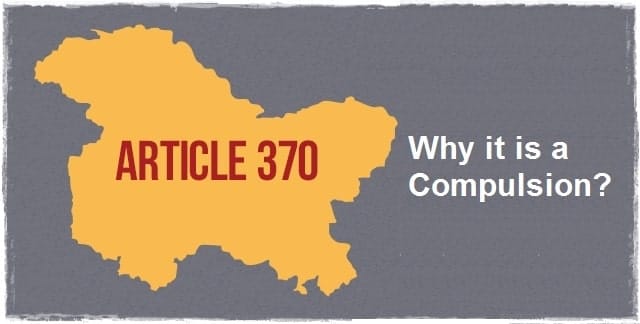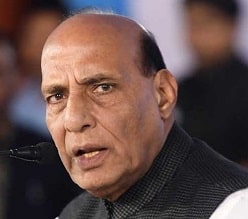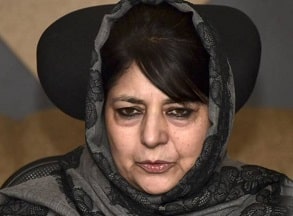All You Need to Know About the Debate on Article 370 and 35a
Recently, there has been a sudden increase in the demand for abrogation of Article 370. The upcoming election has further fueled this matter. BJP echoed its stance on the abolition of special status and article 35A to Jammu & Kashmir, in its manifesto. These provisions prohibit residents of other states from buying assets or reside in the state. The twitter war continues every day. This develops a sense of alienation from Jammu & Kashmir amongst the common resident of India. The feeling is often vice-versa too.

The biggest point of contention is that Article 370 was a “temporary arrangement”. This puts the idea that the state is yet not fully a part of the country.
Background About Accession of Kashmir
Jammu & Kashmir is an integral part of India. It is believed that, Maharaja Hari Singh, King of the state, was reluctant to become a part of the country. At the time of accession, some conditions were placed and few special privileges were bestowed upon it.
Read also: Congress Manifesto 2019 is nothing but a disaster for the national security
All the Princely states were invited to join India’s Constituent Assembly to prepare a constitution for the country. It was decided in 1949 through a meeting of all representatives there was no need for the states to have their own constitution. They agreed to will follow the Indian Constitution. There would be common legislation across the country by the center and state for all the citizens.
Circumstances Leading to Implementation of Article 370
The ones to disagree with the majority were the representatives of Jammu & Kashmir. They insisted for the applicability of only the original Instrument of accession signed by King. This lead to Article 370 becoming a part of the Indian Constitution giving Jammu & Kashmir a self-governing status. Meaning, the Central Government would have authority in only, subject to the consent of the elected State Assembly. The inclusion of article 370 was a “temporary provision” effective only until the State’s Constitution is adopted.
On 25 Jan 1957, state’s constituent assembly dissolved without deciding about Article 370, whether to improve or annul. The provisions were drafted by Sheikh Abdulla, who was appointed Prime Minister of the State at that time.
People, even within the Congress, opposed it
The common view was: Jammu & Kashmir, should become part of India on the same condition as other princely states. A particular condition of 370 was opposed by them as the basic sections related to Fundamental Rights, are not applicable in Jammu And Kashmir.
It was presented in the constituent assembly, when Pt. Nehru was visiting USA. But he had already approved it and it was passed under supervision of Home Minister Sardar VB Patel.
Provisions Of article 370
- The Union of India requires state government’s acceptance to all the laws except Foreign Affairs, Defense, Finances and Communications.
- Majority of the provisions of the Indian Constitution are binding to all the states except Jammu & Kashmir. The entire Part VI is not binding there.
- The residuary powers of law-making belong to the legislature of the state, unlike Parliament, in other states.
- Indian Parliament cannot pronounce Financial emergency in the state.
- The constitution of Jammu & Kashmir cannot be suspended by the Union of India.
- The state assembly amends its own constitution by two-third majority.
- Laws prepared by Parliament do not always include Jammu & Kashmir;
- Any law related to the following matter would abide on the other States, but not Jammu & Kashmir
- Laws related to preventive detention
- Change of the name or modification state territory
- Any agreement or International treaty which upsets any part of the state.
The Political Battle
People who are against abrogation fears that it will have severe repercussions. Kashmiri politicians are giving all kind of threats to ensure applicability of Article 370A and 35A. Have a look.

Omar Abdullah said that his party will toil tirelessly to refurbish the autonomous status of the state. He even said that they would also bring back the post of Prime Minister and President. This was as he spoke at an election rally in Suchetgarh of Jammu & Kashmir.

Home Minister Rajnath Singh cautioned that the government is left with no option but to repeal Article 370 and 35A. This was a counter to Omar Abdullah’s remark about having separate Prime Minister and President.
Read also: The BJP Manifesto 2019 Promise Development but Misses on Key Issues

PDP leader Mahbooba Mufti remarked that the revocation of Article 370 would end India-J&K ties. She further added that the removal of article 370 and 35A from J&K would result in illegal occupation of J&K by India.
Can Article 370 be Removed?
Retracting of Article 370 and 35A, which is creating a buzz in the political arena, appears fairly simple on paper.
There is no need to ask to prove majority in either of the House. President of India has to sign an order. The first line itself says it is a “Temporary provisions with respect to state of Jammu & Kashmir”.
But, it is actually not that simple as Jammu & Kashmir has its own constitution. Even if the two Articles are removed repealed, they remain an integral part of the Jammu & Kashmir constitution. Political parties may use it as an election tool but its removal will generate an ambiguity.
Let’s look at both of these Articles as an agreement between India and Jammu & Kashmir. Both parties enter into an agreement wherein Jammu & Kashmir allies with India, not Pakistan.
The removal of these two Articles will result in the nullification of this agreement by India. How? You will ask. Since Jammu & Kashmir may or may not make similar amendments to their Constitution.
In case they don’t, this relationship stands as a one sided agreement which can be breached or taken false advantage of.
It would create a legal void which can be used by Pakistan and the Hurriyat leaders. They may do so by presenting the abnormality before the International Court of Justice. It will weaken India’s claim over J&K.
What the Citizens Say
A survey conducted by leading newspaper, 91% people voted in favor of repealing Article 370 and 35A. One reader said that this special status given to Jammu & Kashmir and provision which prohibits other Indian citizens from acquiring land or to reside is inappropriate. It sends an incorrect message to the global community as if it is a dubious or disputed land.
